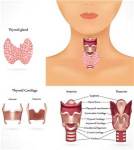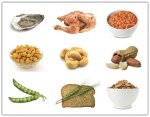
The thyroid gland controls how quickly the body uses energy, makes proteins, and controls how sensitive the body is to other hormones. It participates in these processes by producing thyroid hormones that regulate the growth and rate of function of many other systems in the body. T3 (triiodothyronine) and T4 (and thyroxine; sometimes referred to as tetraiodothyronin) are synthesized from iodine and tyrosine. The thyroid also produces calcitonin, which plays a role in calcium homeostasis.
What can I do if I think I may have an “out of whack” Thyroid?
There are a few different ways to test to see if your thyroid may be under or over active. In my opinion the best way is using a process called the Basal Temperature test.
Because the thyroid gland reflects the body’s metabolic rate and heat is generated during metabolism, assessing body temperature can give clues regarding the function of the thyroid gland.
1. Shake down a thermometer until the mercury falls below 95 degrees Fahrenheit if using an older thermometer. Place it by your bed at night when you retire.
2. Upon waking, before getting up (yes, even to use the bathroom) place the thermometer under your armpit for 10 minutes. Digital thermometers may automatically stop before that. That’s fine. Try to lay in bed as still as possible during this time. Rest and close your eyes. Don’t get up until after the 10 minutes have passed or until a digital thermometer has registered your temperature.
3. Record the temperature, time, and date.
4. Conduct the same test for at least three mornings at the same time each day.
Assessing Your Basal Temperature Test
A healthy resting temperature ranges between 97.8 to 98.2 degrees Fahrenheit or 36.6 to 36.8 degrees Celsius. Natural fluctuations can occur during menstrual cycles. If you are still menstruating, perform the test on the second, third, and fourth days of the menstrual cycle.
Post-menopausal women or men can conduct the tests any days of the month.
If your temperature is consistently lower than the range indicated above for at least three days, this may be an indication of hypothyroidism. Conversely, temperatures consistently higher than this may indicate hyperthyroidism but can also suggest a possible infection. If so, you should see a homeopathic doctor.
What else can I do?
You can also check your neck: An enlarged Thyroid gland can signal that your body is producing too much or too little thyroid hormone.
• Hold a mirror so you can see the front of your neck
• Take a sip of water and hold it in your mouth
• Still looking at the thyroid area
• Tip your head back and swallow
If you notice any bulges check with your homeopathic doctor.
Lastly, your medical physician can do a blood test. Ask him or her to test for thyroid-stimulating hormone (TSH), free T3, free T4, and thyroid antibodies. All four tests give a more accurate picture of the health of your thyroid gland than testing solely for TSH like many doctors do.
What do I do if something is not functioning properly?
1. Get more iodine in your body: a deficiency in this mineral is one of the leading causes of thyroid disease. It is essential to the production of thyroid hormones. Ever notice that your generic table salt is iodized sodium chloride? In many countries, iodine deficiency is a major public health problem that was cheaply addressed by purposely adding small amounts of iodine to the sodium chloride (salt). With everyone on a health kick and trying to reduce sodium, although that is a great idea, if salt was our main source of iodine we say an increase in thyroid related diseases.
Foods high in Iodine: Salmon, Halibut, Eggs, Baked Potatoes, Milk (although I don’t generally support consumption of cow’s milk), Dried Seaweed, some Himalayan Salts, Turkey, Prunes, Navy Beans, Bananas and Strawberries to name a few.
2. Increase your Zinc: Zinc is another mineral extremely important to the production of thyroid hormones so increasing your consumption may be critical. Zinc can quickly become depleted from surgeries or injuries, taking birth control pills, reduced consumption or reduced absorption.
Foods high in Zinc: Oysters, Salmon, Pumpkin Seeds, Dark Chocolate, Garlic, Sesame Seeds, Wheat Germ, Chick peas, Shrimp, Mushrooms, Peanuts, Spinach, Kidney Beans, Flax Seeds and Turkey to name a few.
3. Boost your selenium: Not only is selenium a necessary mineral to the proper functioning of your thyroid but it’s also one of the most important minerals in fighting off cancer. A lot of soil around the world has become depleted of selenium providing foods (even organically grown) to be deficient of this power mineral. One-Two Brazil nuts a day is all your need as it houses enough selenium for your daily intake.
Other foods high in selenium are: Fish, Turkey, Chicken, Mushrooms, Barley, Sunflower Seeds, and Whole Grains.
I hope this article helps and as always feel free to email me if you have any further questions.
Have a wonderful day and may you live longer, healthier and happier.


